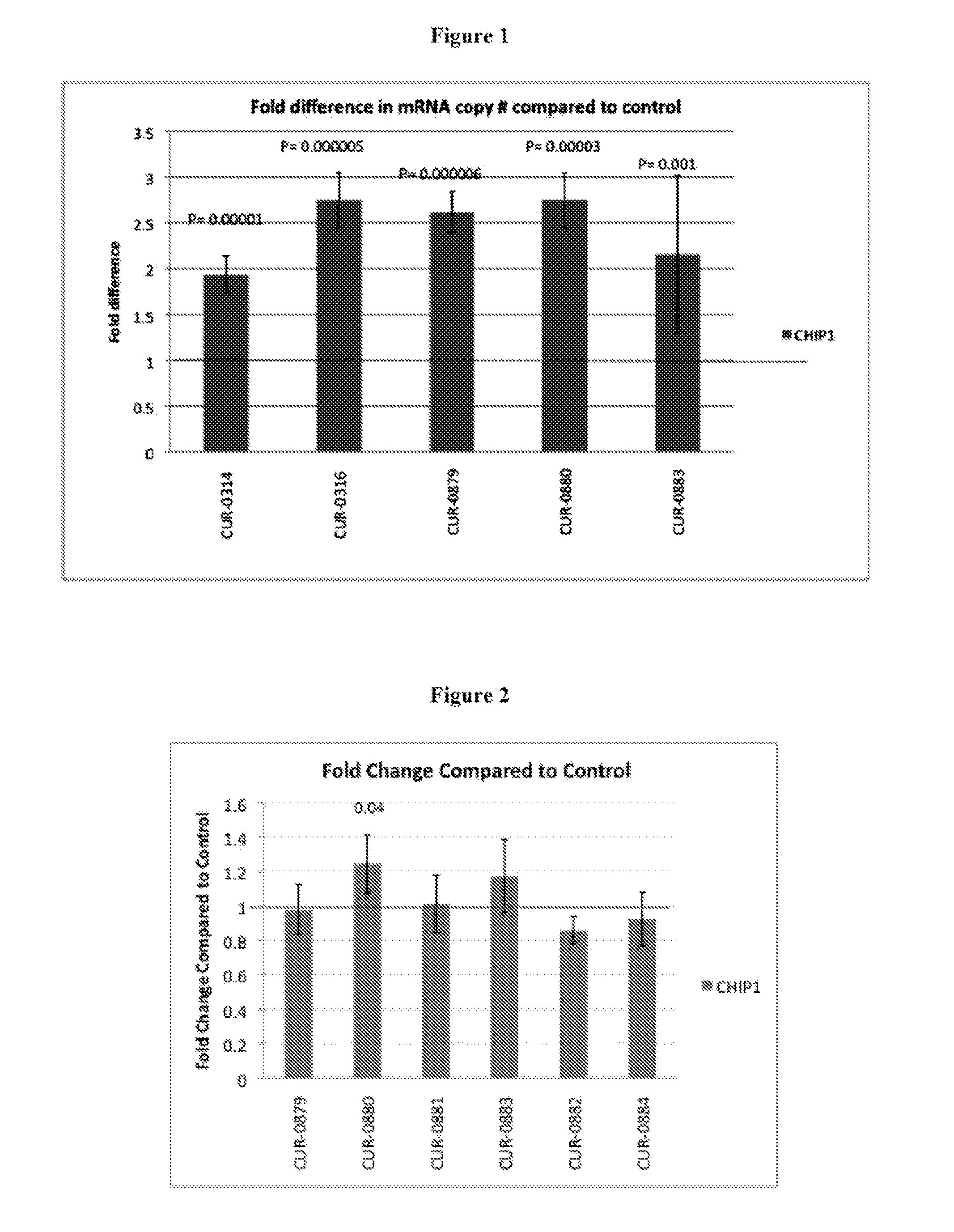Treatment of 'c terminus of hsp70-interacting protein' (CHIP) related diseases by inhibition of natural antisense transcript to chip
a technology of hsp70-interacting proteins and c termini, which is applied in the direction of dna/rna fragmentation, peptide/protein ingredients, animal cells, etc., can solve the problems of interfering with rna splicing, transcription, translation, replication, etc., and achieve the effect of modulating function and/or expression of chip polynucleotides, and modulating function and/or expression of chip polynucleo
- Summary
- Abstract
- Description
- Claims
- Application Information
AI Technical Summary
Benefits of technology
Problems solved by technology
Method used
Image
Examples
example 1
Design of Antisense Oligonucleotides specific for a Nucleic Acid Molecule Antisense to a ‘C Terminus of HSP70-Interacting Protein’ (CHIP) and / or a sense strand of ‘C termiinus of HSP70-Interacting Protein’ (CHIP) Polynucleotide
[0219]As indicated above the term “oligonucleotide specific for” or “oligonucleotide targets” refers to an oligonucleotide having a sequence (i) capable of forming a stable complex with a portion of the targeted gene, or (ii) capable of forming a stable duplex with a portion of an mRNA transcript of the targeted gene.
[0220]Selection of appropriate oligonucleotides is facilitated by using computer programs that automatically align nucleic acid sequences and indicate regions of identity or homology. Such programs are used to compare nucleic acid sequences obtained, for example, by searching databases such as GenBank or by sequencing PCR products. Comparison of nucleic acid sequences from a range of species allows the selection of nucleic acid sequences that disp...
example 2
Modulation of CHIP Polynucleotides
[0228]Treatment of ZR75-1 Cells with Antisense Oligonucleotides
[0229]I.zr-75 cells were grown in RPMI (ATCC #30-2001)+10% FBS+penicillin+streptomycin at 37° C. and 5% CO2. One day before the experiment the cells were replated at the density of 1.5×105 / ml into 6 well plates and incubated at 37° C. and 5% CO2. On the day of the experiment the media in the 6 well plates was changed to fresh growth media. All antisense oligonucleotides were diluted to the concentration of 20 μM. Two μl of this solution was incubated with 400 μl of Opti-MEM media (Gibco cat#31985-070) and 4 μl of Lipofectamine 2000 (Invitrogen cat#11668019) at room temperature for 20 min and applied to each well of the 6 well plates with ZR75-1 cells. A Similar mixture including 2 μl of water instead of the oligonucleotide solution was used for the mock-transfected controls. After 3-18 h of incubation at 37° C. and 5% CO2 the media was changed to fresh growth media. 48 h after addition o...
PUM
| Property | Measurement | Unit |
|---|---|---|
| temperature | aaaaa | aaaaa |
| ionic strength | aaaaa | aaaaa |
| temperature | aaaaa | aaaaa |
Abstract
Description
Claims
Application Information
 Login to View More
Login to View More - R&D
- Intellectual Property
- Life Sciences
- Materials
- Tech Scout
- Unparalleled Data Quality
- Higher Quality Content
- 60% Fewer Hallucinations
Browse by: Latest US Patents, China's latest patents, Technical Efficacy Thesaurus, Application Domain, Technology Topic, Popular Technical Reports.
© 2025 PatSnap. All rights reserved.Legal|Privacy policy|Modern Slavery Act Transparency Statement|Sitemap|About US| Contact US: help@patsnap.com

